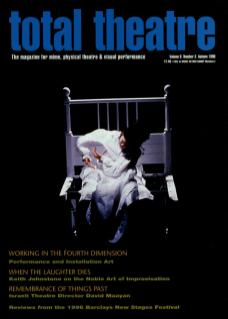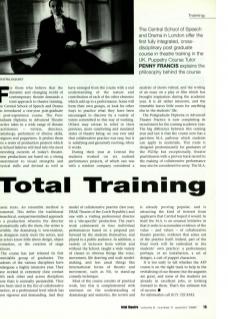For those who believe that the dynamic and changing world of contemporary theatre demands a total approach to theatre training, The Central School of Speech and Drama has introduced a one-year postgraduate or post-experience course. The Postgraduate Diploma in Advanced Theatre Practice takes in a wide range of theatre practitioners – writers, directors, dramaturgs, performers of diverse skills, designers and puppeteers. It pitches them into a series of production projects which the School believes will feed into the most interesting currents of today's theatre. These productions are based on a strong commitment to visual strengths and physical skills and devised as well as classic texts. An ensemble method is promoted. This defies the traditional hierarchical, compartmentalised approach to a production wherein the director automatically calls the shots, the writer is invisible, the dramaturg is non-existent, the designers rarely meet the actors, and the actors know little about design, object animation, or the creation of stage pictures.
The course has just released its first formidable group of graduates. The students of the various disciplines have undergone a highly intensive year. They have worked in extremely close contact with each other and across disciplines more than is normally permissible. They have been tried in the fire of collaborative practice, at a professional level which has been rigorous and demanding. And they have emerged from the course with a real understanding of the nature and contribution of each of the other elements which add up to a performance. Some will form their own groups, or look for other ways to practice what they have been encouraged to discover by a variety of tutors committed to this way of working. Others may retreat in relief to their previous, more comforting and insulated states of theatre being: no one ever said that collaborative practice was easy, but it is satisfying and genuinely exciting, when it works.
During their year at Central the students worked on six realised performance projects, of which one was with a resident company considered a model of collaborative practice (last year, DRAK Theatre of the Czech Republic); and one with a visiting professional director on a 'site-specific’ production. The year's work culminated in four individual performances based on a proposal put forward by the students themselves, and played to a public audience. In addition, a variety of lecturers from within and without the School, taught a wide variety of classes in obvious things like voice, movement, life drawing and scale modelmaking, and less usual things like international forms of theatre and movement, such as Nô, to stand-up comedy technique.
Most of the course consists of practical work, but this is complemented with seminars on the understanding of dramaturgy and semiotics, the review and analysis of shows visited, and the writing of an essay on a play or film which has brought inspiration during the academic year. It is all rather intensive, and the timetable leaves little room for anything else in the student’s life.
The Postgraduate Diploma in Advanced Theatre Practice is now completing its recruitment for the coming academic year. The big difference between this coming year and last is that the course now has a part-time MA pathway which students can apply to undertake. This route is designed predominantly for graduates of the PGDip but, exceptionally, theatre practitioners with a proven track record in the making of collaborative performance may also be considered for entry. The MA is already proving popular, and is attracting the kind of interest from applicants that Central hoped it would. In itself the MA is an unusual initiative in that it seeks to accumulate evidence of the value – and values – of collaborative theatre practice, evidence that arises out of the practice itself. Indeed, part of the final work will be embodied in the students' own practice: a performance perhaps, or an installation, a set of designs, a cast of puppet characters.
It is too early to tell whether the ATP course is on the right track to help in the revitalising of our theatre; but the auguries are good, and some of the students are already in excellent jobs, or looking forward to them. That's the ultimate test of success.

